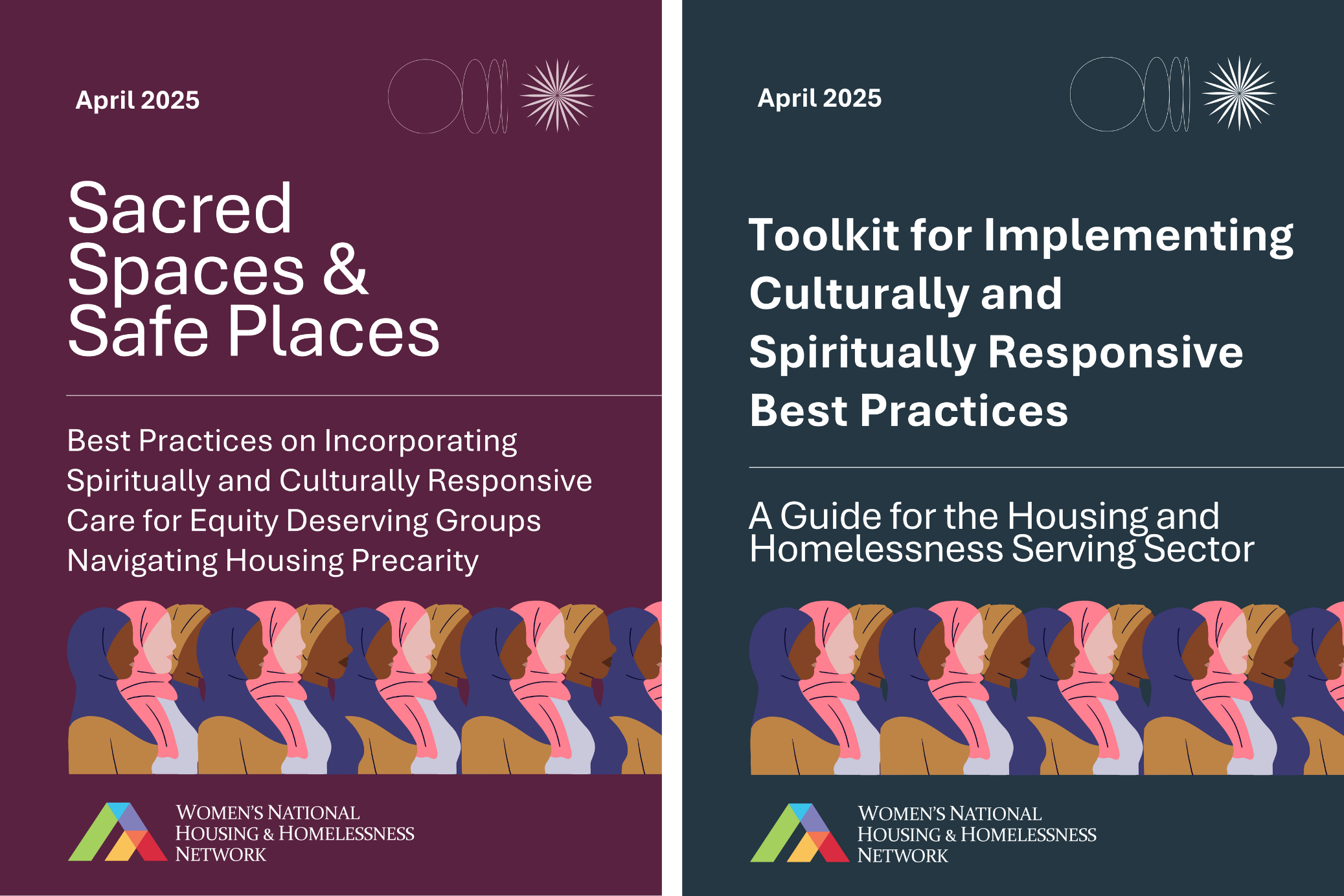Best Practices & Toolkit Launched Today: Advancing culturally and spiritually responsive care in housing and homelessness services
 The Women’s National Housing & Homelessness Network is proud to launch two new, complementary resources to support a more equitable, inclusive, and healing-centred housing and homelessness sector in Canada.
The Women’s National Housing & Homelessness Network is proud to launch two new, complementary resources to support a more equitable, inclusive, and healing-centred housing and homelessness sector in Canada.
These tools are designed to guide service providers, advocates, and policymakers in creating environments where culturally and spiritually responsive care is not only possible—but prioritized.
These resources were developed through a national Community of Practice series that brought together frontline workers, lived experts, researchers, advocates, and organizational leaders from across the housing and homelessness sector.
Over several months, participants engaged in deep, cross-sector conversations about the role of culture, spirituality, and identity in housing responses—sharing challenges, promising practices, and visionary ideas for more inclusive service delivery.
What emerged was a collective call for transformation: to recognize and respond to the full humanity of those navigating housing precarity, and to build systems rooted in cultural safety, spiritual care, and relational accountability.
Watch the Training Webinar Here
1. Sacred Spaces & Safe Places: Best Practices on Incorporating Spiritually and Culturally Responsive Care for Equity-Deserving Groups Navigating Housing Precarity
This report outlines evidence-informed, community-driven best practices for supporting individuals and communities navigating housing precarity with approaches that reflect their cultural and spiritual needs. It highlights the specific barriers that Indigenous, Black, racialized, 2SLGBTQ+, newcomer, and disabled women and gender-diverse people face when accessing housing and homelessness services—and the gaps that exist in current systems.
Grounded in research, lived experience, and the voices of community leaders, Sacred Spaces & Safe Places identifies six core components of spiritually and culturally responsive care, explores promising practices across the sector, and provides recommendations for transforming housing systems to better reflect the needs of those most affected by housing injustice.
2. Toolkit for Implementing Culturally and Spiritually Responsive Best Practices: A Guide for the Housing and Homelessness Serving Sector
This companion resource is a practical, hands-on guide for service providers, frontline workers, managers, and organizational leaders seeking to implement culturally and spiritually responsive practices in their work. It translates the research and principles outlined in the Sacred Spaces & Safe Places report into actionable strategies that organizations can begin applying immediately.
The toolkit includes:
-
Reflection questions to assess your organization’s current practices and readiness
-
Step-by-step guidance for developing culturally safe spaces
-
Case examples from across Canada
-
Tools for relationship-building, staff training, and organizational accountability
-
Strategies for working alongside communities in respectful, reciprocal ways
Why These Resources Matter
For too long, housing and homelessness services in Canada have been shaped by one-size-fits-all approaches that overlook or actively erase the cultural, spiritual, and identity-based needs of marginalized communities. This erasure is not benign—it causes harm, reinforces systemic inequities, and deepens mistrust in services.
Culturally and spiritually responsive care is essential to supporting women and gender-diverse people who are navigating housing precarity, especially those from communities who continue to face colonial, racist, ableist, and gender-based violence. When services reflect and respect the whole person—spirit, culture, community, and lived experience—they are more effective, empowering, and just.
Who These Resources Are For
These tools are intended for anyone working in or alongside the housing and homelessness sector, including:
-
Housing providers and shelter workers
-
Transitional and supportive housing staff
-
Outreach workers and harm reduction teams
-
Non-profits, community organizations, and grassroots groups
-
Policy advocates and decision-makers
-
Indigenous housing initiatives and service providers
-
Equity and inclusion leads and program developers
Whether you are starting this work or looking to deepen your practice, these resources are designed to meet you where you are and support you in building more just, responsive, and affirming housing systems.
Join Us in Building Safer, More Sacred Spaces
We encourage all housing and homelessness stakeholders to engage with these resources and consider how they can be used in your own organizations and communities. We also recognize that this work is ongoing and collective—and that meaningful change requires sustained commitment, humility, and accountability.
By centring culturally and spiritually grounded care, we can begin to reshape housing systems to better reflect the people they are meant to serve—and to honour the wisdom, dignity, and strength of those who continue to lead the way forward.
Watch the Training Webinar
Thank you to our funder for making this project possible:


